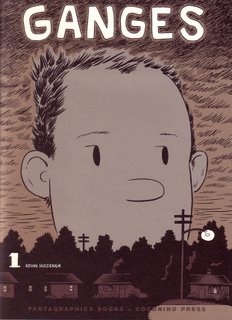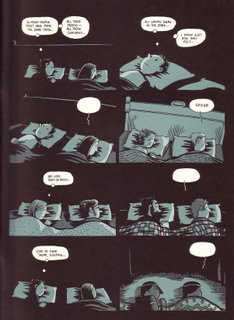Ganges #1
 Isn't it a delight when the WeboComicsBlogoNet hypes something to death ... and then it delivers? The Pickytarian, Ian Brill, Jog (and here), Tom Spurgeon and others all threw their weight behind Kevin Huizenga's Ganges. I dithered a bit, as my comics budget is tight and it seemed hard to justify $7.95 for 32 pages.
Isn't it a delight when the WeboComicsBlogoNet hypes something to death ... and then it delivers? The Pickytarian, Ian Brill, Jog (and here), Tom Spurgeon and others all threw their weight behind Kevin Huizenga's Ganges. I dithered a bit, as my comics budget is tight and it seemed hard to justify $7.95 for 32 pages.
It turns out that $7.95 for 32 pages of Ganges is a bargain. It's a beautiful edition, oversized and made with quality paper, but it's the content that makes this book a rich, dense, rewarding experience that's worth every penny that Fantagraphics' "Ignatz" line demands.
Kevin Huizenga fills those oversized pages with stylistic experimentation, but keeps it all grounded in a well-observed life. In particular, "Bed" really shines as an example of why Huizenga has garnered so much acclaim and "buzz". There's exciting stylistic work here, as the story is mainly told on pure black pages that uses simple shapes of limited color to communicate a wealth of emotion. That formal experiment never overwhelms the story, however. The page is not the point, the medium is not the message. Huizenga never loses sight of the simple little matters of life that give the book it's charm and appeal. In too much autobiography, be it thinly-veiled or not, there's a temptation to lay on story and structure and meaning, with the events of the day acting as leitmotifs reminding us of the central theme of this particular life. It's in no way limited to comics, though it can certainly be seen in many indy comic creators like Seth or Chris Ware. Life obeying rules of thematic coherence is a lie, and it's why we turn to fiction: to give order to the chaos of our lives. Though the experimentation of the first story, "Time Traveling", is certainly eye-catching ... it's the simplicity of a day where the big concerns are litter, The Beatles, and the perils of late-night coffee that really make Ganges shine. Kevin Huizenga manages to be introspective without a hint of neuroses or narcissism, and he fully accepts that it doesn't all add up to a great thematic statement: it simply is. Ganges particularly shines in his depiction of Ganges' wife, Wendy, as she comes off the page with a wit and a character of her own that does not merely exist as a foil or counterpoint.
In too much autobiography, be it thinly-veiled or not, there's a temptation to lay on story and structure and meaning, with the events of the day acting as leitmotifs reminding us of the central theme of this particular life. It's in no way limited to comics, though it can certainly be seen in many indy comic creators like Seth or Chris Ware. Life obeying rules of thematic coherence is a lie, and it's why we turn to fiction: to give order to the chaos of our lives. Though the experimentation of the first story, "Time Traveling", is certainly eye-catching ... it's the simplicity of a day where the big concerns are litter, The Beatles, and the perils of late-night coffee that really make Ganges shine. Kevin Huizenga manages to be introspective without a hint of neuroses or narcissism, and he fully accepts that it doesn't all add up to a great thematic statement: it simply is. Ganges particularly shines in his depiction of Ganges' wife, Wendy, as she comes off the page with a wit and a character of her own that does not merely exist as a foil or counterpoint.
If there is a central theme, it is about time and how we swim in it. From repetitious routines that can make us feel stuck in a loop, to the possible futures of a litterer, to the weight of age, to the pressures of sleep as night weighs down ... it's all about time, be it geologic or imaginative. There's no conclusion, though, no summation. Huizenga examines the reactions we can have, and how time impacts up in many ways without trying to shove its square peg into a round hole.
This is my first exposure to Kevin Huizenga, but it won't be my last. I feel as excited as when I first read It's A Good Life, If You Don't Weaken, and saw something that spoke with elegance and love.

No comments:
Post a Comment